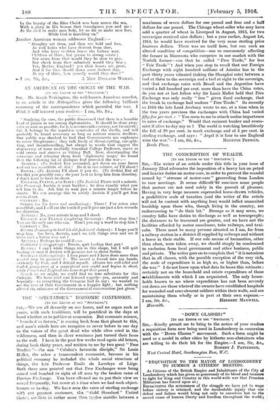THE CONSCRIPTION OF WEALTH.
[TO THE EDITOR OF THE " SPECTATOR:1
Sra,—The writer of an article under this title in your issue of January 22nd advocates the imposition of a heavy tax on petrol and heavier duties on motor-cars, in order to prevent the scandal caused by " streams of motor-cars " jit„roceeding from London to race meetings. It seems difficulORT convince some people that motors "are not used solely in the pursuit of pleasure. Having in very large measure superseded horse-drawn vehicles, a prohibitive scale of taxation (and the writer of the article will not be content with anything less) would inflict unmerited hardship upon those who, though living in the country, are endeavouring to " do their bit." Strange as it may seem, we country folks have duties to discharge as well as townspeople; the distances to be traversed are greater, and we have not the facilities afforded by motor omnibuses, tube railways, and taxi- cabs. There must be many persons situated as I am, far from a railway station in a district ill supplied by railways and without a horse in their stable. If our sole means of locomotion, other than afoot, were taken away, we should simply be condemned to exclusion from local government and other business, public and private. The writer goes on to complain that" it is notorious that in all classes, with the possible exception of the very rich, the scale of expenditure is as high as, or higher than, before the war." I do not Lwow upon what data he bases this estimate : certainly not on the household and estate expenditure of those establishments with which I am acquainted. The only house- holds known to me where expenditure has not been severely cut down are those whereof the owners have established hospitals for wounded and convalescent soldiers within their walls, and are maintaining them wholly or in part at their own expense.—


































 Previous page
Previous page